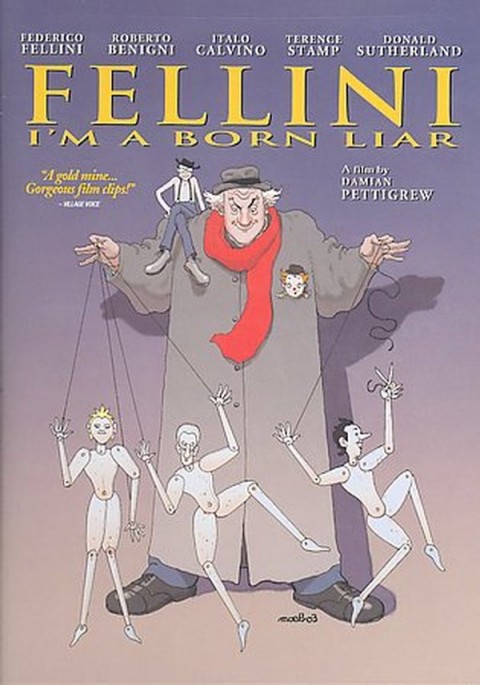“If you know little about Fellini,” warns Roger Ebert in his review of Fellini: I’m a Born Liar (watch it free online here), “this is not the place to start.” Perhaps he rightly issues such a disclaimer about a formally unorthodox documentary that plunges deeply and immediately into the aesthetics of its subject’s work while paying barely any heed to the facts of his life. But if you can’t say that Federico Fellini dealt near-exclusively in aesthetics, you can’t say it about anyone. The director’s love of artifice, which eventually led to his total dedication to shooting all scenes on a soundstage, produced motion pictures so flamboyant yet so distinctive and personal that first-time viewers still find themselves undecided as to whether to call them elegant or grotesque. The verdict, as any regular attendee of revival screenings of 8½, Juliet of the Spirits, Satyricon, and Amarcord knows, is that they’re both: grotesque to the extent of their elegance, and elegant to the extent of their grotesqueness. This already gives documentarian Damian Pettigrew much to work with, and indeed, he would have had the material and expertise to assemble a robust essay film on Fellini’s visuals alone. But he chose to make a fresher examination.
Though he premiered the movie in 2002, Pettigrew’s real work on I’m a Born Liar began nearly twenty years before. In 1983, he met with the Italian novelist Italo Calvino, intending to shoot a documentary about him. But upon realizing that their conversations came around inevitably to Fellini, the writer arranged a surprise meeting of the two filmmakers. Years later, Fellini would submit to the ten-hour interview from Pettigrew that structures this film. Certain collaborators give testimony, notably still-shaken actors like Donald Sutherland and Terence Stamp. But Calvino’s own appearance turns out to shed the most light on his countryman’s work, and vice versa, not least because both of them preferred to find the truth through elaborate fabrication. I’m a Born Liar’s surprisingly thorough Wikipedia page quotes a passage from Calvino’s Mr. Palomar that supposedly inspired Fellini on a shoot, but may also reflect the whole basis of his craft: “Life on the surface is so rich and various that I have no urge to enquire further. I believe that it is only when you’ve come to know the surface of things that you can try to find out what lies beneath. But the surface of things is inexhaustible.”
Related content:
Federico Fellini Introduces Himself to America in Experimental 1969 Documentary
Fellini’s Fantastic TV Commercials
John Turturro Reads Italo Calvino’s Animated Fairy Tale
Colin Marshall hosts and produces Notebook on Cities and Culture. Follow him on Twitter at @colinmarshall.



hello there and thank you for your information – I’ve definitely picked up something new from right here. I did however expertise a few technical points using this site, as I experienced to reload the site a lot of times previous to I could get it to load properly. I had been wondering if your web host is OK? Not that I am complaining, but slow loading instances times will sometimes affect your placement in google and could damage your quality score if advertising and marketing with Adwords. Anyway I’m adding this RSS
to my e‑mail and can look out for a lot more of your respective intriguing
content. Ensure that you update this again soon.